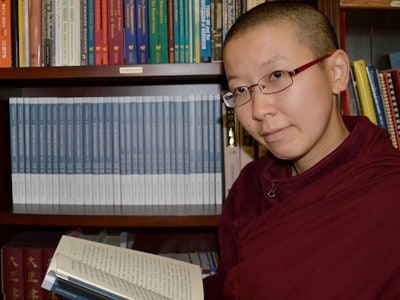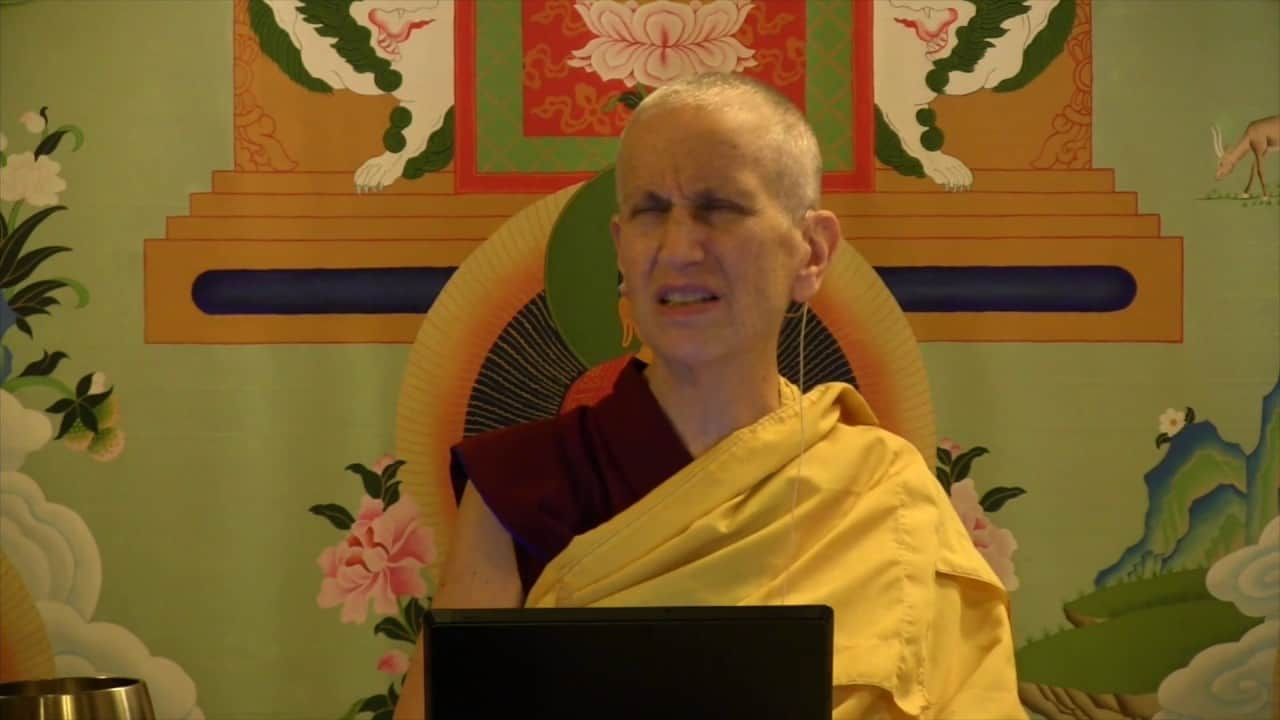Attributes of true origins: Conditions
Part of a series of short talks on the 16 attributes of the four truths of the aryas given during the 2017 winter retreat at Sravasti Abbey.
- How craving operates in terms of the creation of karma
- Craving as both a cause and a condition
- The importance of having a vision of what we can become
Continuing with the 16 attributes, we’ve been doing the ones on the second truth, true origins.
- Craving and karma, which are used as the examples of true origins, they’re the cause (refuting that dukkha arises causelessly).
- They’re the origin, because they repeatedly produce dukkha. That eliminates the idea that there’s just one cause for dukkha.
- The third one was that they’re strong producers, because they act forcefully to produce dukkha. That eliminates the idea that there’s some kind of external creator or something else that causes us harm.
The fourth one:
Craving and karma are conditions (for dukkha) because they also act as the cooperative conditions that give rise to suffering.
If we look, if we study the 12 links (of dependent origination), in the order of them craving comes after feeling, the idea being that we contact objects, feeling arises (pleasant, unpleasant, or neutral), and then according to the feeling a particular kind of craving arises–craving for more of the pleasant feelings, craving to be free of the unpleasant ones, and so on), and so through this craving we then create karma. And then that karma causes dukkha.
That’s one way in which craving operates in terms of the creation of karma. It also operates as a condition for the ripening of the karma, because at the time of death the karma that was the second link (formative action) that propels (or projects) the next life, that karma is nourished by craving and clinging. Craving and clinging nourish it so that that karmic seed then becomes what is called renewed existence, where the karmic seed is just about ready to project the next life, so it fully ripens it. In that case, craving acts as a condition for the ripening of the karma that produces (in this case) a rebirth in samsara.
Are you seeing that craving is both a cause, and in other circumstances it’s a condition? And it’s equally important as both of them. If you don’t have craving as the cause, you don’t create the formative action that is the seed for the next rebirth. If you don’t have craving at the end of this life—that gives rise to clinging and renewed existence—then whatever karmic seed you have on your mindstream that could propel another life does not have the conditions to be able to ripen.
This is what happens, for example, on the mindstream of arhats. They still may have karma that could produce another lifetime, but it can’t ripen because there’s no craving and clinging whatsoever.
Knowing this eliminates the wrong idea that our dukkha is fundamentally permanent, but sometimes impermanent. We know this one already, because we look that way about ourselves. There’s a real me that stays the same, and then something superficial changes. The same thing about our condition of being in samsara. Our condition of samsaric dukkha is permanent, it doesn’t change, there’s nothing to do about it. But it does change because we also have varieties of dukkha. And one type of misery is not always there, it alternates. So if you get bored with one, another one will come along.
This is showing that we shouldn’t think that our state of dukkha can’t be overcome because it’s permanent, even though there are times when it fluctuates. It isn’t necessarily the dukkha of pain for this moment, it’s the dukkha of change, or whatever. It helps us to see that dukkha can be eliminated, it’s not permanent. it’s not the default mechanism that’s always going to be there. As long as we’re ignorant it’s the default mechanism. Or the default result. But as soon as we are able to realize emptiness then it’s possible to free ourselves from that. That’s what this fourth one shows.
You can see how, in our lives, it’s very easy for us to hold any of these wrong ideas. For example, thinking craving and clinging have nothing to do with my unhappiness. It’s God’s will. It’s somebody else’s fault. Or craving and karma, that’s just what’s always going to be there, so there’s no use trying to oppose it. Anyway, it’s inherent in me. This is one of the really bad views, you can see that many people who are very intelligent in a worldly way, this dukkha is just inherent in being a human being, and science is going to be the miraculous cure for it. Except how do you stop aging, sickness, and death? Time goes on, so you can’t stop aging. Maybe sickness… Unless they really can figure things out very well, difficult about sickness. Anyway, even when you’re not sick, your body breaks down, doesn’t it? It’s just parts get old. It’s like an old used car that has a lot of miles on it, and it’s just kind of hanging on there, but it’s going to collapse sometime.
People who have that view, no wonder there’s so much alcoholism and drug abuse. When you think this is just the natural default and there’s nothing you can really do about it. As long as we have our amygdala (or whatever it is), then we’re doomed. What are they going to do? Replace our brain with some computer that is programmed so it doesn’t respond like an amygdala? Then they think there’s no possible way to change the situation, and that certainly leads to a lot of depression and feelings of hopelessness. Whereas, if we can overcome those wrong kinds of ideas, then see that there’s always hope, there’s always opportunity, that there’s something that can be done. That if you eliminate the causes, the result ceases. And the causes can be eliminated. Then the whole way you look at life completely changes.
That’s why it’s important to look at these 16 aspects and look at the wrong views that they oppose, and see if they’re kind of lurking somewhere in the back of your mind. Like the time when you just wake up on the wrong side of the bed, and then everybody who smiles at you really is intending to criticize you. So you just get totally discouraged and throw up your hands: “It’s useless. I can’t do this. Dharma path just doesn’t work.” When your mind gets into that state, what are you going to do? We’d better figure out something to do because if that happens right before we die then we’re really doomed. Very important, how to overcome those kinds of misconceptions in ourselves.
When we were going through in Precious Garland the bodhisattva grounds, then one person said to me, “I just can’t relate to that, they just seem so out of the ordinary, like a fantasy. I can’t relate.” If you can’t relate to that, then you don’t have a vision of what you can become. And having a vision of what we can become is so important in our lives. Not only as spiritual practitioners, but one of the problems in poor neighborhoods, or minority neighborhoods that are often oppressed, is that the kids don’t have a vision of what they can become. And without a vision of what we can become then you don’t do anything. Having that vision is very important. So I said to this person, “Okay, so maybe you can’t relate to emanating 100,000 bodies and visiting 100,000 pure lands, and so on. Maybe you can’t relate to that. But there are certain of those qualities that you can see that right now you have this much [holds fingers close together] of. Like maybe we have this much [little bit] compassion that reaches out to sentient beings. So we don’t have the ability to create all these emanations that go out, but we do have some intention, even though it’s this big to do that. So if you take that small intention that you have right now, and you nourish it and you feed it, it will grow until, eventually, you accumulate all the other causes and conditions necessary, and then you can send out all these emanations. But if you just go from looking and thinking “my poor quality view, I’m nothing” to “look at the qualities of the 10th ground bodhisattvas,” then you think it’s hopeless. There’s nothing that they and I have in common. As if those 10th grounders were born that way and they never had to start out like us.
We’re full of this kind of wrong idea, and you can see how it plays a role, how it comes up in your practice sometimes. When you just say to yourself “I’m not making any progress.” Do you ever say that to yourself? [laughter] “I’m not making any progress. Same distraction every meditation session.” We really have to oppose these wrong ideas. Otherwise, they sneak up and they really wreak havoc.
Venerable Thubten Chodron
Venerable Chodron emphasizes the practical application of Buddha’s teachings in our daily lives and is especially skilled at explaining them in ways easily understood and practiced by Westerners. She is well known for her warm, humorous, and lucid teachings. She was ordained as a Buddhist nun in 1977 by Kyabje Ling Rinpoche in Dharamsala, India, and in 1986 she received bhikshuni (full) ordination in Taiwan. Read her full bio.


